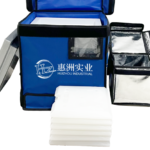Insulated boxes are often used to keep items within a specific temperature range, whether they are warm or cold. Common incubator materials include:
1. Polystyrene (EPS):
Properties: Polystyrene, commonly known as foam, has good insulating properties and lightweight properties. It is a low-cost material that is often used in disposable or short-term incubators.
Application: Suitable for transporting light items or food, such as seafood, es krim, dll..
2. Poliuretan (Pu):
Fitur: Polyurethane is a rigid foam material with excellent insulating properties and structural strength. It insulates better than polystyrene, but it also costs more.
Applications: It is often used in incubators that require long-term insulation or need stronger and more durable insulation, such as pharmaceutical delivery and high-end food distribution.
3. Polypropylene (PP): Fitur:
Polypropylene is a more durable plastic with good heat and chemical resistance. It is heavier than polystyrene but can be used multiple times.
Application: Ideal for reusable insulation needs, such as domestic or commercial food and beverage distribution.
4. Fiberglass: Fitur
: Fiberglass incubator has very high insulation performance and durability. They are typically heavier and more expensive, but can provide excellent long-term insulation.
Application: Suitable for transporting items under extreme conditions, such as laboratory samples or special medical supplies.
5. Stainless steel:
Fitur: The stainless steel incubator has high durability and excellent thermal insulation performance, while being easy to clean and maintain. They are typically heavier and more expensive than plastic materials.
Applications: Commonly used in food service and medical applications, especially in environments that require frequent cleaning or disinfection.
The choice of these materials usually depends on the specific requirements of the incubator, including how long it will be held, how much weight it will carry, and whether it needs to be waterproof or chemically resistant. Choosing the right material can maximize insulation while considering cost and durability.
Is there a contamination problem with the incubator?
Whether or not an incubator can be contaminated depends on its materials, manufacturing process, and methods of use and maintenance. Here are some key factors and recommendations to ensure safety when using an incubator:
1. Material Safety:
– High-quality coolers often use safe and harmless materials, such as food-grade plastic, stainless steel, or aluminum. Make sure that the cooler you choose complies with international or national food safety standards, such as FDA (Food and Drug Administration) or EU standards.
– Some low-quality coolers may use materials that contain harmful chemicals, such as heavy metals or plasticizers containing phthalates, which may migrate into food.
2. Manufacturing Process:
– Understand whether the manufacturing process of the incubator meets environmental and health standards. Some manufacturers may use toxic chemicals in the production process, which may remain in the product.
3. Use and maintenance:
– Keep the incubator clean. The incubator should be thoroughly cleaned before and after use, especially the inner surfaces, to prevent bacterial growth and potential chemical migration.
– Check that the insulated box is intact. A damaged incubator may affect its structural integrity, making it easy for bacteria to accumulate.
4. Avoid direct contact with food:
– If you are concerned about the safety of the materials inside the cooler, you can pack the food in an airtight container or food-grade plastic bag to prevent direct contact with the inner wall of the cooler.
5. Environmental Factors:
– Consider choosing an incubator made of recyclable materials to reduce environmental pollution. Selain itu, choosing a durable incubator can reduce waste generation.
6. Branding and Certification:
– It is generally safer to choose an incubator from a well-known brand as these brands are obligated to adhere to strict safety standards. Check that the product has relevant safety certifications, such as those for food contact materials.
By considering the above factors, the health and environmental problems caused by the use of incubators can be greatly reduced. Proper selection, maintenance, and use of incubators are key to ensuring food safety.























